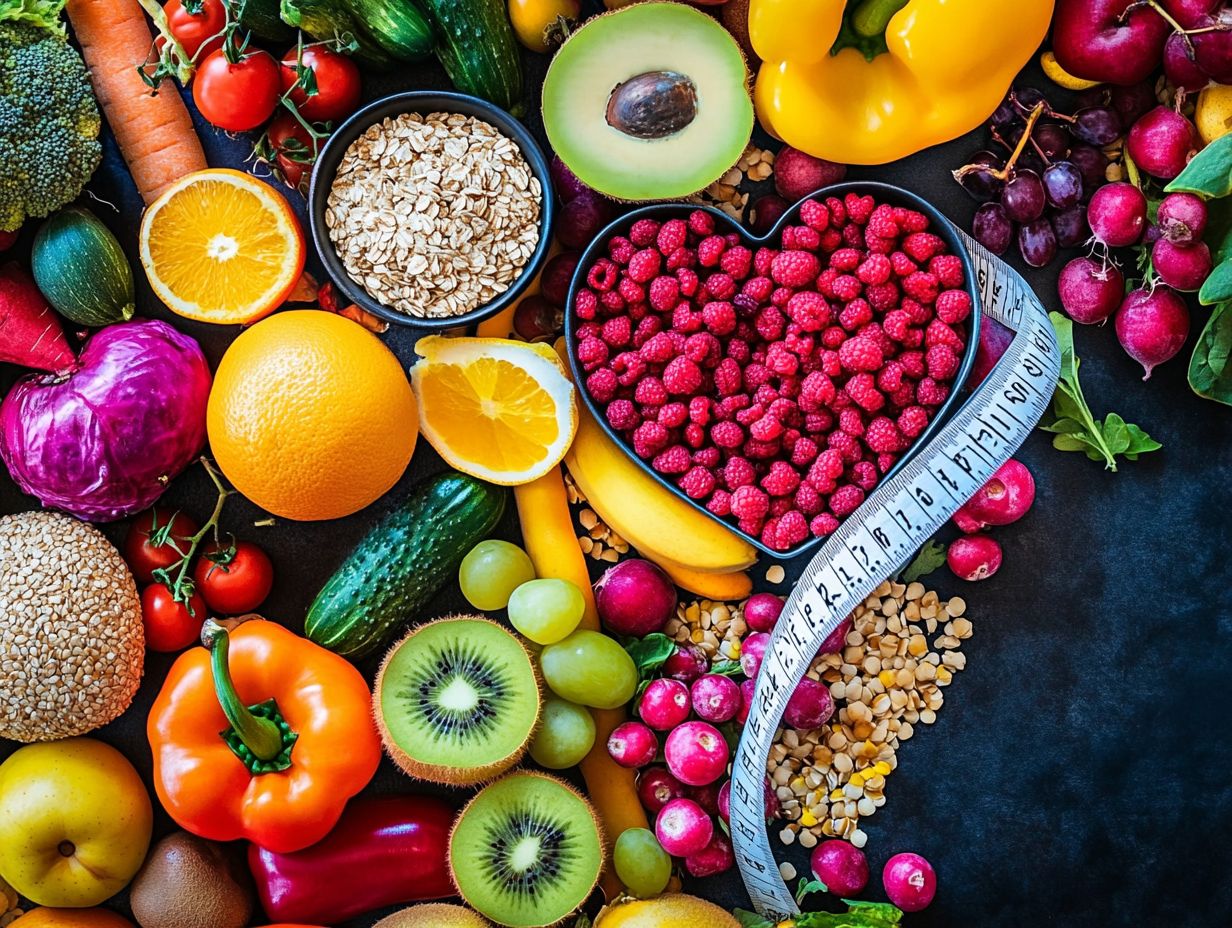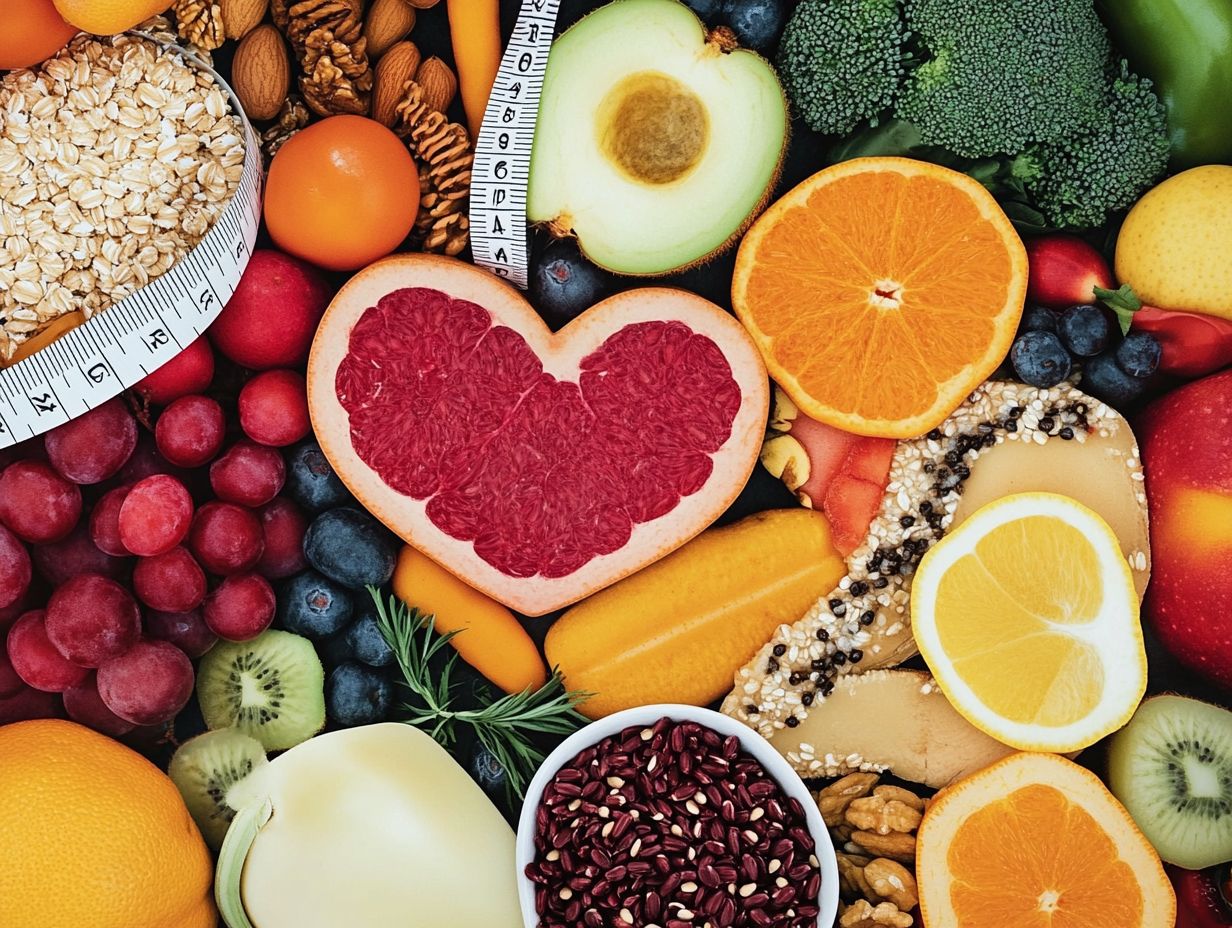The Impact of Food Choices on Health
Food transcends mere sustenance; it holds a key role in your overall health and well-being.
The dietary choices you make can greatly impact both your physical and mental wellness. Ultimately, they shape your risk for various health issues.
This guide looks at the important connection between what you consume and how you feel. It reveals the harmful effects of poor food choices while highlighting the advantages of a nutritious diet.
You will discover practical strategies to overcome obstacles to healthy eating. Learn how to craft a sustainable eating plan that fosters a healthier lifestyle. Start your journey to better health today by choosing the right foods!
Contents
- Key Takeaways:
- The Connection Between Food and Health
- The Effects of Unhealthy Food Choices
- The Benefits of a Healthy Diet
- How to Make Healthier Food Choices
- Overcoming Barriers to Healthy Eating
- Creating a Sustainable Healthy Eating Plan
- Frequently Asked Questions
- What is the significance of food choices on our health?
- How does a healthy diet affect our health?
- What are the potential consequences of poor food choices on our health?
- How do food choices impact our risk of developing chronic diseases?
- What are some strategies for making healthier food choices?
- Can making changes to our food choices improve our overall health?
Key Takeaways:

Poor food choices can lead to a variety of health problems, such as obesity, heart disease, and diabetes.
A healthy diet can improve overall health and well-being, including physical and mental health.
Incorporating nutritious foods into your diet and addressing obstacles to healthy eating can help create a sustainable, long-term healthy eating plan.
The Connection Between Food and Health
The connection between food and health is truly complex. Understanding the impact of fast food on health reveals how your food choices significantly impact your overall well-being.
To understand how dietary changes affect your health, it s essential to explore various factors. These include biological influences, psychological factors, social frameworks, economic conditions, and cultural backgrounds.
This relationship goes beyond mere nutritional intake; it weaves into your daily life and shapes how you engage with food in social settings.
Understanding the Relationship
Understanding the relationship between food and health requires you to recognize how your dietary choices are influenced by consumer attitudes and beliefs about nutrition. These attitudes are shaped by cultural traditions, media portrayals, and emerging health trends.
For example, the growing awareness of plant-based diets has sparked curiosity and adoption across different demographics. This prompts many to critically assess their eating habits.
As you navigate your food choices, it’s common to reflect on your personal health goals and the societal pressures around you. This underscores the need for a deeper understanding of nutrition.
By grasping the connection between these beliefs, you gain insight into how they influence your choices and impact broader market dynamics and public health initiatives.
The Effects of Unhealthy Food Choices
Unhealthy food choices expose you to various health risks. These include obesity, eating disorders, and emotional eating, all intricately linked to stress and mood fluctuations.
This interplay can create a detrimental feedback loop. Poor dietary habits can amplify mental health challenges, driving you toward even poorer food choices.
Common Health Problems Caused by Poor Diet
Common health problems stemming from a poor diet include obesity and nutrient deficiencies. These issues can significantly compromise your overall health and well-being.
These problems often intertwine with chronic conditions like diabetes, cardiovascular diseases, and hypertension. This complicates your health landscape further.
When you skimp on essential vitamins and minerals, your immune system may weaken. This makes it harder to fend off infections.
A lack of fiber leads to digestive issues like constipation. This underscores the importance of balanced meals that incorporate whole grains, fruits, and vegetables.
Emphasizing healthy eating habits not only helps mitigate these risks but also fosters a vibrant, energetic lifestyle. Ultimately, it enhances both your physical and mental well-being.
The Benefits of a Healthy Diet

By embracing a healthy diet filled with nutrient-dense foods, you can enhance your health. Well-balanced meals ensure that your body gets the essential vitamins and minerals it craves.
This thoughtful approach promotes optimal functioning and significantly reduces health risks.
Improvements in Overall Health and Well-being
Your overall health and well-being can often be traced back to the regular consumption of nutritious foods and balanced meals. These choices significantly enhance both your physical and emotional wellness.
For instance, adopting a diet rich in fruits, vegetables, whole grains, and lean proteins can boost your cardiovascular health. It can also lower your risk of chronic diseases and help you maintain a healthy weight.
Incorporating omega-3 fatty acids, found in fish and nuts, is beneficial too. These healthy fats enhance cognitive function and alleviate symptoms of depression and anxiety.
Nutritious eating boosts emotional resilience. Foods high in antioxidants substances that help protect your body from damage combat oxidative stress, leading to better emotional responses during tough times.
This relationship between your diet and mental clarity emphasizes the impact your food choices have on your daily life.
How to Make Healthier Food Choices
Choosing healthier foods can be a game changer for your well-being! It’s crucial for maintaining a balanced diet, and there are several effective tips to guide you in selecting more nutritious options.
These strategies often include enhancing your cooking skills, modifying your meal patterns, and improving your access to healthier foods. By incorporating these practices, you can elevate your culinary experience while nourishing your body.
Tips for Incorporating Nutritious Foods into Your Diet
Incorporating nutritious foods into your diet is achievable through effective meal planning and honing your cooking skills. This paves the way for healthier eating habits.
Start by crafting a weekly menu that seamlessly integrates a vibrant array of fruits and vegetables into every meal breakfast, lunch, and dinner. Embrace seasonal produce; it enhances flavors and boosts health benefits, making your meals more satisfying.
Mastering basic cooking techniques like steaming, roasting, or saut ing can transform simple ingredients into delightful dishes that excite your palate. Explore new recipes to keep mealtime fun, and prep your fruits and veggies in advance to ensure healthy choices are always available.
Engaging in batch cooking and creatively repurposing leftovers can further solidify your commitment to nutrient-rich eating while alleviating the stress of daily meal prep.
Overcoming Barriers to Healthy Eating
To successfully navigate the challenges of healthy eating, a thoughtful approach is essential. Issues such as low-income diets, limited food access, stress, and peer influence can profoundly shape your dietary choices.
Addressing these barriers involves recognizing the influences around you. Social circles often prioritize convenience over nutrition, making it difficult to select healthier options when dining out.
Economic constraints can also hinder your progress, as fresh produce is often more expensive than processed foods. Emotional eating triggered by stress or anxiety complicates efforts to maintain a balanced diet.
To tackle these issues, consider forming supportive social networks that promote accountability and inspire positive choices. Budgeting for meal planning can also make healthy eating more attainable. Additionally, incorporating mindfulness practices helps you address emotional triggers, leading to more conscious food choices.
Creating a Sustainable Healthy Eating Plan
Crafting a sustainable healthy eating plan demands developing long-term strategies. This involves integrating meal planning and dietary interventions to ensure balanced meals and reap ongoing health benefits.
Long-term Strategies for Maintaining a Healthy Diet
Maintaining a healthy diet requires consistent meal patterns and good cooking skills. Prioritize these elements to create a framework for lifelong wellness.
Planning your meals helps you handle busy schedules. This ensures nutritious options are always available.
Improving your cooking skills allows you to make balanced meals at home. This reduces your need for processed foods.
Learn about the good things in food. This knowledge helps you make better decisions for your health.
Engage with local resources like cooking classes. They provide motivation and help you stick to your healthy eating goals.
Frequently Asked Questions
What is the significance of food choices on our health?
Food choices greatly affect our health and well-being. They provide essential nutrients, energy, and protection against diseases.
How does a healthy diet affect our health?

A healthy diet filled with whole and unprocessed foods can transform your health for the better. It lowers the risk of chronic diseases and boosts your mood and energy.
What are the potential consequences of poor food choices on our health?
Poor food choices can harm your health. Diets high in processed foods and sugars lead to obesity and other serious conditions.
How do food choices impact our risk of developing chronic diseases?
Eating unhealthy foods increases the risk of chronic diseases. Choosing fruits, vegetables, whole grains, and lean proteins helps prevent these issues.
What are some strategies for making healthier food choices?
Focus on adding more whole and unprocessed foods to your meals. Reading labels and planning ahead can keep you on track.
Can making changes to our food choices improve our overall health?
Absolutely! Small changes in your food choices can lead to significant health improvements. Start today by adding more nutrient-dense foods and staying hydrated.






